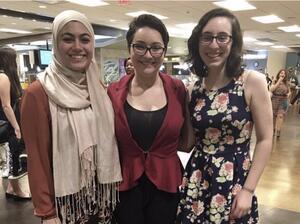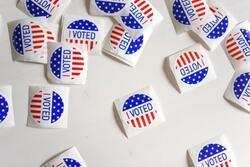Post-It Note Privilege
I never thought a wall that looked like a ransacked Office Depot would twist my stomach into such knots. Staring at this window half-full of sticky notes shouldn’t be this uncomfortable. I should be fine, right? Since when did colorful paper products make my chest tight and my eyes blink rapidly with all the fear of someone who’s done something wrong? But it wasn’t just the notes tacked to the glass. No, I was facing something much more terrifying than organizational tools. Something far more important.
Privilege.
More specifically, my privilege.
It was late February 2016, I was at a social justice conference hosted by students at the University of North Carolina at Chapel Hill, and we were in the middle of an activity designed to help us visualize privilege. For this exercise, students stood in a line across from a wall covered in Post-it notes and a moderator read out phrases like, “When I ask to speak to a manager at a business, I can expect it to be someone of my own race,” or “My school’s breaks traditionally line up with the holidays my family celebrates.” If the sentence applied to you, you walked to the other side of the room, took a sticky note, put it on your shirt, and crossed back to the line. By looking to either side, you could literally see who in the room had the most privilege. And according to this activity, I was riddled with it.
By the time the college student leading the exercise was finished with the last sentence, my chest was a kaleidoscope of pastel pieces of paper.
It wasn’t that I had the most sticky notes of anyone there, not even close, but glancing down the line it was plain to see that I fell solidly in the upper half. I squirmed. My stomach turned as I stared at the other students’ bodies. Wasn’t my job supposed to be calling out other people? All the feminism I knew was a narrative from the perspective of a victim; I felt icky and awkward in my newfound position.
In the discussion after the activity, we sat in a circle and stared at each other’s bodies. Having such a visible reminder of the myriad of experiences people were coming from shaped a respectful, eloquent conversation that I feel lucky to have been a part of. We talked about what privilege means and how to navigate having it, and my fellow participants helped me realize that there isn’t anything wrong with simply having privilege. After all, it’s not something you can help. The real work, as I would come to learn, was in recognizing my situation and using it to better the world for others. However, for a considerable amount of time after that sticky note exercise, I still felt something dirty and uncomfortable clawing at my insides when I thought about my role in activist causes.
I didn’t get that that was exactly the point.
Recognizing your own privilege for the first time is deeply disquieting. It can feel like you’re doing something wrong, or as if you can’t participate in social justice efforts because you benefit directly from the oppression of others. And those feelings may never fully go away, but that’s okay.
That discomfort is crucial. It’s what reminds me that there’s a problem and that I need to be doing everything I can to help fix it. It can be a motivating force. And the privilege I benefit from gives me a lot of power to speak up, but—and better yet—it gives me a platform to raise other voices up. Voices of kids whose t-shirts were bare, who only had a slip or two of paper.
Working on addressing your privilege can be simple. For instance, following and engaging with new people on social media who come from different backgrounds and experiences. Or it can be a more involved process, like organizing community discussions about important issues. For example, this past fall, as the secretary of my high school’s Girl Up club, I initiated and led a month-long period products donation drive for low-income and homeless women. I also planned an event at the end of the month to organize all the donations into supply packs that were distributed to various local shelters. Before this event, I’d never considered what it would be like to get my period and not have a private bathroom, or the funds to buy pads and tampons. Now, it’s something I’m intensely aware of every single month.
It doesn’t help anyone to sit around and feel badly about who you are or where you came from. Instead, the point is to sit with the awkward, and let it guide and humble you. The point is to grit your teeth against what’s easy, against the path of least resistance, and start doing what must be done to ensure that in ten, 20, or 50 years, the next Post-It note activity has a row of teenagers with an equal number of office supplies tacked to their chests.
This piece was written as part of JWA’s Rising Voices Fellowship.








Excellent!
Thanks for sharing this well written article on an important subject with ideas to address community inequalities.